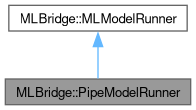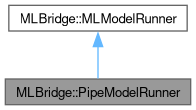A MLModelRunner that asks for advice from an external agent, or host. More...
#include <PipeModelRunner.h>


Public Member Functions | |
| PipeModelRunner (llvm::StringRef OutboundName, llvm::StringRef InboundName, SerDesKind Kind, llvm::LLVMContext *Ctx=nullptr) | |
| void | requestExit () override |
| virtual | ~PipeModelRunner () |
 Public Member Functions inherited from MLBridge::MLModelRunner Public Member Functions inherited from MLBridge::MLModelRunner | |
| MLModelRunner (const MLModelRunner &)=delete | |
| MLModelRunner & | operator= (const MLModelRunner &)=delete |
| virtual | ~MLModelRunner ()=default |
| template<typename T > | |
| std::enable_if< std::is_fundamental< T >::value, T >::type | evaluate () |
| Main user-facing method for interacting with the ML models. | |
| template<typename T > | |
| std::enable_if< std::is_fundamental< typenamestd::remove_pointer< T >::type >::value, void >::type | evaluate (T &data, size_t &dataSize) |
| Main user-facing method for interacting with the ML models. | |
| Kind | getKind () const |
| SerDesKind | getSerDesKind () const |
| template<typename U , typename T , typename... Types> | |
| void | populateFeatures (const std::pair< U, T > &var1, const std::pair< U, Types > &...var2) |
| User-facing interface for setting the features to be sent to the model. | |
| template<typename U , typename T , typename... Types> | |
| void | populateFeatures (const std::pair< U, T > &&var1, const std::pair< U, Types > &&...var2) |
| void | populateFeatures () |
| void | setRequest (void *request) |
| Mainly used in the case of gRPC where the request object is not known explicitly. | |
| void | setResponse (void *response) |
| Mainly used in the case of gRPC where the response object is not known explicitly. | |
Static Public Member Functions | |
| static bool | classof (const MLModelRunner *R) |
Private Member Functions | |
| void | send (void *data) |
| void * | receive () |
| void * | evaluateUntyped () override |
| Should be implemented by the derived class to call the model and get the result. | |
| std::string | readNBytes (size_t N) |
Private Attributes | |
| std::string | InboundName |
| int | Inbound = -1 |
| std::error_code | OutEC |
| std::error_code | InEC |
| std::unique_ptr< llvm::raw_fd_ostream > | OutStream |
Additional Inherited Members | |
 Public Types inherited from MLBridge::MLModelRunner Public Types inherited from MLBridge::MLModelRunner | |
| enum class | Kind : int { Unknown , Pipe , gRPC , ONNX , TFAOT } |
| Type of the MLModelRunner. More... | |
 Protected Member Functions inherited from MLBridge::MLModelRunner Protected Member Functions inherited from MLBridge::MLModelRunner | |
| MLModelRunner (Kind Type, SerDesKind SerDesType, llvm::LLVMContext *Ctx=nullptr) | |
| MLModelRunner (Kind Type, llvm::LLVMContext *Ctx=nullptr) | |
 Protected Attributes inherited from MLBridge::MLModelRunner Protected Attributes inherited from MLBridge::MLModelRunner | |
| llvm::LLVMContext * | Ctx |
| const Kind | Type |
| const SerDesKind | SerDesType |
| std::unique_ptr< BaseSerDes > | SerDes |
Detailed Description
A MLModelRunner that asks for advice from an external agent, or host.
It uses 2 files - ideally named pipes - one to send data to that agent, and one to receive advice. The compiler will send observations; the host is expected to reply with a tensor value after each observation as a binary buffer that's conforming to the shape of the advice. Interleaved, the data closely resembles the training log for a log where we don't capture the reward signal.
Note that the correctness of the received data is the responsibility of the host. In particular, if insufficient data were sent, the compiler will block when waiting for an advice.
Note that the host can either open the pipes RW, or open first the pipe to the compiler - i.e. the "Inbound" - and then the "Outbound", to avoid deadlock. This is because the compiler first tries to open the inbound (which will hang until there's a writer on the other end).
Definition at line 55 of file PipeModelRunner.h.
Constructor & Destructor Documentation
◆ PipeModelRunner()
| MLBridge::PipeModelRunner::PipeModelRunner | ( | llvm::StringRef | OutboundName, |
| llvm::StringRef | InboundName, | ||
| SerDesKind | Kind, | ||
| llvm::LLVMContext * | Ctx = nullptr ) |
Definition at line 33 of file PipeModelRunner.cpp.
◆ ~PipeModelRunner()
|
virtual |
Definition at line 77 of file PipeModelRunner.cpp.
Member Function Documentation
◆ classof()
|
inlinestatic |
Definition at line 60 of file PipeModelRunner.h.
◆ evaluateUntyped()
|
overrideprivatevirtual |
Should be implemented by the derived class to call the model and get the result.
Implements MLBridge::MLModelRunner.
Definition at line 134 of file PipeModelRunner.cpp.
◆ readNBytes()
|
private |
Definition at line 85 of file PipeModelRunner.cpp.
◆ receive()
|
private |
Definition at line 120 of file PipeModelRunner.cpp.
◆ requestExit()
|
inlineoverridevirtual |
Implements MLBridge::MLModelRunner.
Definition at line 64 of file PipeModelRunner.h.
◆ send()
|
private |
Definition at line 106 of file PipeModelRunner.cpp.
Member Data Documentation
◆ Inbound
|
private |
Definition at line 75 of file PipeModelRunner.h.
◆ InboundName
|
private |
Definition at line 74 of file PipeModelRunner.h.
◆ InEC
|
private |
Definition at line 77 of file PipeModelRunner.h.
◆ OutEC
|
private |
Definition at line 76 of file PipeModelRunner.h.
◆ OutStream
|
private |
Definition at line 78 of file PipeModelRunner.h.
The documentation for this class was generated from the following files:
- include/MLModelRunner/PipeModelRunner.h
- MLModelRunner/PipeModelRunner.cpp